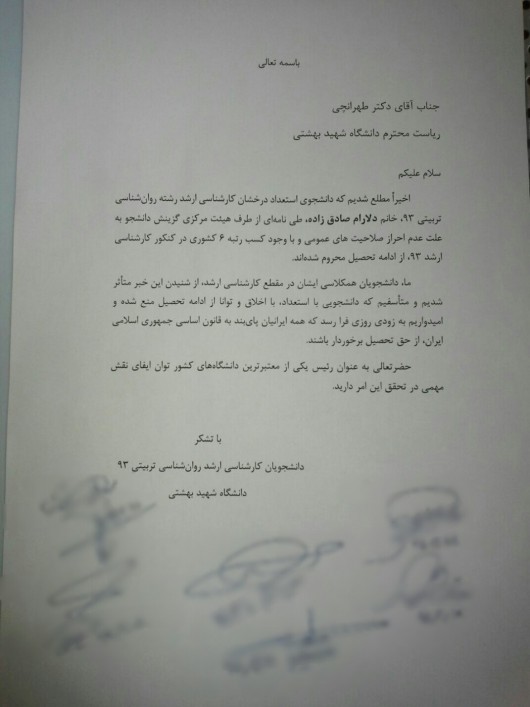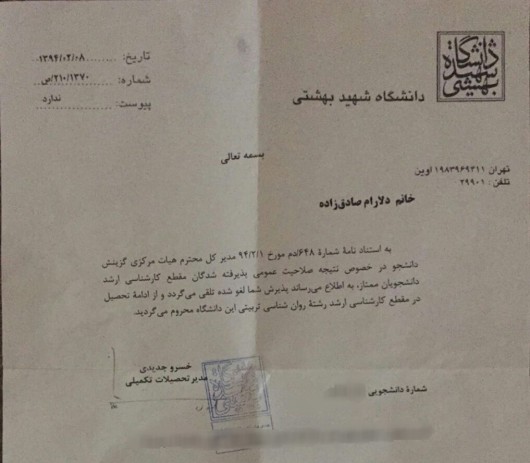Source: www.radiozamaneh.com
7 December 2015
By Sepehr Atefi
Translation by Iran Press Watch

April 2015 – Delaram Sadeghzadeh, a Masters degree applicant in educational psychology at Shahid Beheshti University, waits in the office of the Director of Graduate Studies to obtain her student permit, but upon hearing her name the secretary informs her that there is a problem.
– What is the problem?
– Please wait a moment.
She has been waiting for a few minutes before the director comes toward her holding a letter.
– I don’t have good news for you.
He apologetically informs her that her university admission has been canceled by order of the chairman of the Central Student Selection Committee due to “general ineligibility of honors students in a Masters degree program,” and that she will not be allowed to continue her education.
Delaram Sadeghzadeh was an honors graduate student in the department of Educational Psychology; that was why she advanced to the Masters degree program. This was the first year that the university’s honors students also had to participate in entrance examinations, but their acceptance was enough for entrance to the Masters program. Delaram Sadeghzadeh sat for the national entrance exams and ranked sixth in the country.
Khosrow Jadidi, director of Graduate Studies at Shahid Beheshti University, regrets this, as it is the first time that an honors student’s eligibility has been revoked. Thus she joins the ranks of the multitude of Baha’is who have been banned from higher education, though few have come this far.
“Incomplete file” has been code for denying Baha’is access to education for many years. Rejection of their chosen subject, refusal of admission to university, expulsion after the first semester, etc., are all strategies of the Islamic Republic of Iran, following the cultural revolution and the “anti-revolution purge” in universities, to deny higher education to members of the Baha’i community. But Delaram Sadeghzadeh did not stop there. She started to follow up by visiting the Ministry of Science, the department’s deputy director of research, the group leader, National Education Measurement and Evaluation Organization and other responsible authorities. The dean of Shahid Beheshti University refused to see her and did not reply to her petitions. The faculty of Psychology and her fellow students were saddened by her expulsion. Some of them wrote a letter to Dr. Mohammad Mehdi Tehranchi, dean of Shahid Beheshti Univerity. “…We have recently learned that Delaram Sadeghzadeh, honors student in the Masters program in Educational Psychology, has been prohibited by the Central Student Selection Committee from continuing her education due to her lack of eligibility, despite her ranking of number six in the national entrance exams. We, her fellow students in the Masters program, are saddened by the news and are sorry that a talented and capable student of good moral standing has been prevented from continuing her education. We hope a day will come soon when all Iranians who abide by the Constitution of the Islamic Republic of Iran will have the right to education…”
Contrary to the promises of the Ministry of Science provisional supervisor, Jafar Tofighi, at the beginning of the Rohani administration, not only were expelled university students not reinstated, but the systematic denial of education to Baha’is has continued apace during the “Prudence and Hope” administration. Jafar Tofighi announced that anyone who feels that their rights have been violated must definitely appeal to the Ministry of Science.

Following Tofighi’s statement, many Baha’i students appealed to the Ministry of Science. Rumors of a committee created to specifically review cases of religious minorities’ right to education raised the hopes of many, but not a single one was reinstated.
Morteza Noorbakhsh is chairman of the Central Student Selection Committee. Delaram’s long walks through the corridors of the School of Psychology, Ministry of Science and the National Education Measurement and Evaluation Organization brought her to his office.
The website of the Secretariat of the Student Selection Committee states: “According to the 1982 resolution of the Supreme Council of the Cultural Revolution, the Central Student Selection Committee is responsible to assess the general eligibility of all students in the country.”
In response to the complaints of Baha’i students who were denied access to higher education because of an “incomplete file”, Morteza Noorbakhsh said there was nothing he could do, because a resolution of the Supreme Council obstructs Baha’is from access to education. Delaram asked Noorbakhsh why she did not pass the general eligibility requirements.

– You are a Baha’i, you know that.
– Are you denying education to Baha’is based on a regulation? If so, your regulation is against the Constitution, and if not, your actions are illegal.
Noorbakhsh got angry.
– Are you accusing a government official of doing something illegal?
– You have denied me access to education.
– I don’t make these decisions on my own.
– You are the chairman of the committee that sent me the letter denying me access to education.
Noorbakhsh did not even invoke the legal impediments to education for Baha’is.
Leaked confidential documents and letters in recent years testify to the fact that on 25 February 1991, the Supreme Council of the Cultural Revolution ratified a law to “impede the progress and expansion of the Baha’i community”; in universities, “if a student is identified as a Baha’i, whether during the application process or during the course of studies, they must be expelled.” This law has been carried out relentlessly during reformist as well as fundamentalist and moderate administrations.
Although Mohammad Khatami’s administration removed the religion column from the national registration application forms, most Baha’i applicants were still not admitted to university. Disqualification of Baha’is is not limited to university education. After the Islamic Revolution, Baha’is in Iran have been subjected to all kinds of restrictions and pressure, and are always treated as second-class citizens.
Leave a Reply